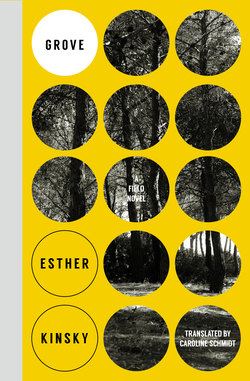Читать книгу Grove - Esther Kinsky - Страница 13
На сайте Литреса книга снята с продажи.
ОглавлениеDying
NOT LONG AFTER ARRIVING in Olevano, I had a dream:
I encounter M. He is standing in a doorway. Behind him is a room filled with white light. M. is like he used to be: calm, composed, plump again almost.
There’s nothing terrible about being dead, he says. Don’t worry.
Half-awake, I remembered the dreams I had of my father after he died. My father always stood in the light. Waved. Laughed. I stood in the shadows. At first farther away, then ever closer. In one dream he took me sledding and stayed behind in the white hills, laughing, while alone on the sled I glided down into a snowless valley.
In the afternoon that same day, farther down in the village I saw a dead person being brought out of a house. The body was laid out on a gurney and covered from head to toe. Two paramedics wheeled it through the building entrance into the street, where an ambulance waited. The front door to the multistory house was open behind them. No one followed the paramedics and in every apartment the street-facing blinds were pulled down. No one stood on a balcony and raised a hand to wave farewell. The ambulance blocked traffic on the steep road to the village and the tunnel into the hinterland. A small traffic jam had formed, drivers honked their horns. The gurney appeared strangely tall to me, as if distorted; an adult would stand barely a head above the gurney’s edge and while contemplating the dead body, feel like a child. I imagined standing at the gurney at eyelevel with the dead man, whose eyelids had already been pressed shut, as that is the first task of paramedics and doctors once death is established. The eyelid of the dead becomes a false door, like those found in Egyptian and early Etruscan tombs. The blanket on the dead man gleamed matte. It appeared to be of a heavy, black, synthetic material, like a darkroom curtain.
